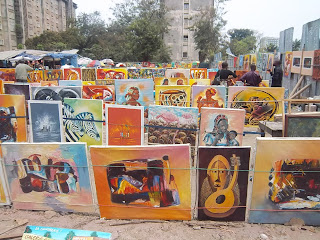Dear
Friends and Loved Ones,
For
breakfast this morning we had French toast or as the French would say pain perdu. We take
reading labels very seriously here because "truth in labeling" isn't
quite like in the states. Countries that provided the ingredients for that meal
included Morocco (cooking oil), Egypt (strawberry jam-not sure how close it
came to a real strawberry), South Africa (honey), DR Congo (bread, yoghurt, and
eggs), and Ireland through Switzerland (powdered milk made in Ireland by a
Swiss company). We purchased paper towels the first week we were here. They
proved to be good in the sense that they didn't disintegrate on contact with
anything. Try as we may without checking all the sales slips we cannot remember
where we purchased them. As with so many things, here today, gone tomorrow. The
stores get shipments from suppliers and they don't know what will be in them so
the possibility exists that they may never have that item again.
The same
is true for fresh fruits and vegetables. Many stores that cater to the expat
crowd have European fruits and vegetables, but the prices are alarming. We
wanted to make a dish with lemon juice so we bought a lemon for 90 cents, not
bad (gulp). We try to buy locally grown fruits and vegetables because they are
cheaper and fresher. We have fresh tomatoes, green beans, cucumbers, courgette
(a zucchini-like veggie), green peppers, onions and just yesterday fresh
locally grown cabbage. For comparison, the South African store, Shoprite, had
cabbage imported that cost 6 to 10 dollars for a medium-sized head. The cabbage
we purchased yesterday was really fresh and only cost $3 for a medium-size
head. The DRC currency is called Francs Congolais so I think sometimes the real
cost in dollars is less - $3 for a head of cabbage - outrageous.
We made
one of our favorite salads “Niçoise” with fresh green beans, tomatoes, hard boiled eggs, boiled
potatoes, olives, green onion, red wine vinaigrette and tuna. Fresh tuna, sushi quality, is
not available and even it were it may not be safe so we used a can of tuna
which is of pretty good quality. When fresh foods are available it is good to
take advantage without delay. We also found sweet potatoes here. The sweet
potato has quite a history and it is thought that it originated here. The ones
we bought were quite gnarly but we had mashed sweet potatoes with our dinner
and they were the best, super sweet.
Don't
mean to spend so much time talking about food and the method of acquiring it
but it does take up a lot of our time.
Janine,
my sister-in-law wrote that there was snow on the mountains and cool weather in
the valley. I look out the window of our home office (actually a second
bedroom) and watch the day turn into night in a matter of minutes, I mean in minutes. The same thing happens every
day - 5:20 p.m. Sun goes out of sight and by 5:50 it’s dusk and 6:10 pm it is dark.
As Miracle Max said in Princess Bride, "There is a big difference being
mostly dead and being all dead." Well here in Kinshasa, Congo, when it is
mostly dark it is all dark, no moon nor stars can be seen. It is dark. Light
returns about 5:30 AM. Today it was as if a huge forest fire was burning close
by so no sun was detected until midday.
Our
construction site this week is the huge building across the street from our
apartment. Ralph, my brother, could tell us the cost of the two massive cranes
on top of this building said to be in "bankruptcy" and no work has
occurred during the years that missionaries have been in this building - about
six years. One Saturday we saw some men gathered on the ground floor but they
are the only humans we have seen. Cement, cinder block and rebar are the major
construction materials used here as you can see. Much of the construction sites
are on hold. It is said that they build until the money runs out and then they
wait until they get more money, sometimes years.



























